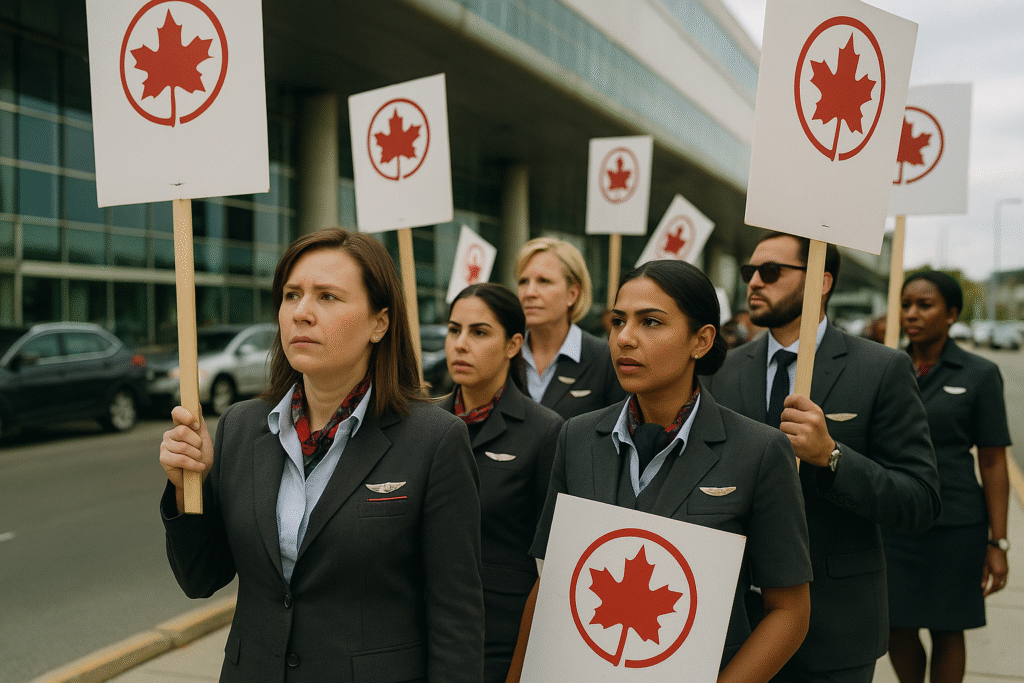
Overview
Air Canada is on the verge of a full-fledged shutdown, as more than 10,000 flight attendants represented by the Canadian Union of Public Employees (CUPE) as a 72-hour strike notice after unsuccessful pay talks. The strike can begin at 1 pm on Saturday, if no compromise is reached, with and cancellation of widespread flights beyond it.
What Is The Strike Doing?
- Breakdown of conversation: The conversation between Air Canada and Cup has fallen after eight months. The airline offered a 38% increase in total compensation in four years, including a 25% increase in the first year, as well as pension, crew comfort, and increased benefits. CUPE dismissed the proposal, citing concerns about underpayments and unpaid work.
- Unpaid ground work: Flight attendants argue that they currently perform an average of 35 unpaid hours per month for tasks such as boarding, pre-flight safety checks, and waiting at airports-none of which are compensated under the current system.
- Mediation refused: Air Canada proposed to solve the deadlock through binding arbitration. CUPE refuses, the airline should agree to a better deal that directly gives importance to all its labor, including ground duties.
Period Of Events
- March 31, 2025 – The current mass agreement ends.
- May 2025 – CUPE requested federal reconciliation. This process began, followed by a 21-day cooling-off period.
- July 2025 – Flight attendants cast heavily in favor of the strike authority.
- August 8 – Air Canada assured passengers that flights were still on time.
- August 11 – As a protest at Toronto Pearson Airport, the cabin crew demands appropriate compensation.
- August 12 – Air Canada declared a formal deadlock and indicated a possible strike or lockout from 16 August.
- On August 13, two parties issued a 72-hour notice. The cancellation of flights in anticipation of a possible shutdown began immediately.
Impact On Passengers
- Flight Cancellation: Starting from Thursday, Air Canada and Air Canada Rouge will extend the operation in a full shutdown by Saturday. An anticipated one hundred thirty thousand passengers can be affected consistently in a day.
- Regional flights unaffected: Air Canada Express flights, operated via Jazz and Pal, will keep servicing regions; however, they encompass the most effective 20% of the total operations.
- Refund and Rebooking: Passengers affected by cancellation are eligible for a full refund. Air Canada is coordinating with another carrier to re -boil the affected passengers.
- Advance Plan Key: Passengers are advised to carefully monitor the flight conditions, check the email or app information, and avoid visiting the airport without confirmation.
Government Response
The federal government is not interfering with the back-to-paintings law. Instead, officials, consisting of the labour minister, have endorsed both sides to preserve negotiations in the correct direction, emphasizing the need to attain a voluntary disposal on the relevant solutions.
Understanding The Stakes
- Economic pressure: This summer, Air Canada and its passengers are under pressure. A long-term strike will affect revenue, prestige, and logistics between fuel prices and inflation.
- Workforce Realities: Flight attendants emphasize that their job is more than hospitality – it includes significant security and technical responsibilities that are currently unpaid.
- Public sympathy and investigation: CUPE’s message on social media highlights how wages are stagnation and prolonged in real life. Meanwhile, Air Canada aims to maintain operations during one of the busiest travel seasons and preserve its brand.
What should passengers do?
- Be informed: For the fare replacement, frequently take a look at the Air Canada internet site or mobile app.
- Know your rights: If your flight is canceled, you are entitled to full refunds under Canadian air passenger protection guidelines – even during labor disruption.
- Consider alternatives: If travel is vital, don’t forget the usage of nearby offerings with different companies, or, while available.
- Further plan: Book with flexibility, consider travel insurance (although paying attention to many policies, excluding labor disputes), and be prepared for sudden change.
Looking Ahead
A small window of hope remains: If the conversation starts again before the strike deadline, the disruption can be postponed. Both sides still express the desire to talk, but the clock is standing.
For Air Canada, a proposal will protect its summer revenue and international reputation. For flight attendants, a strong contract reflects the full scope of their important role in airline operations.

